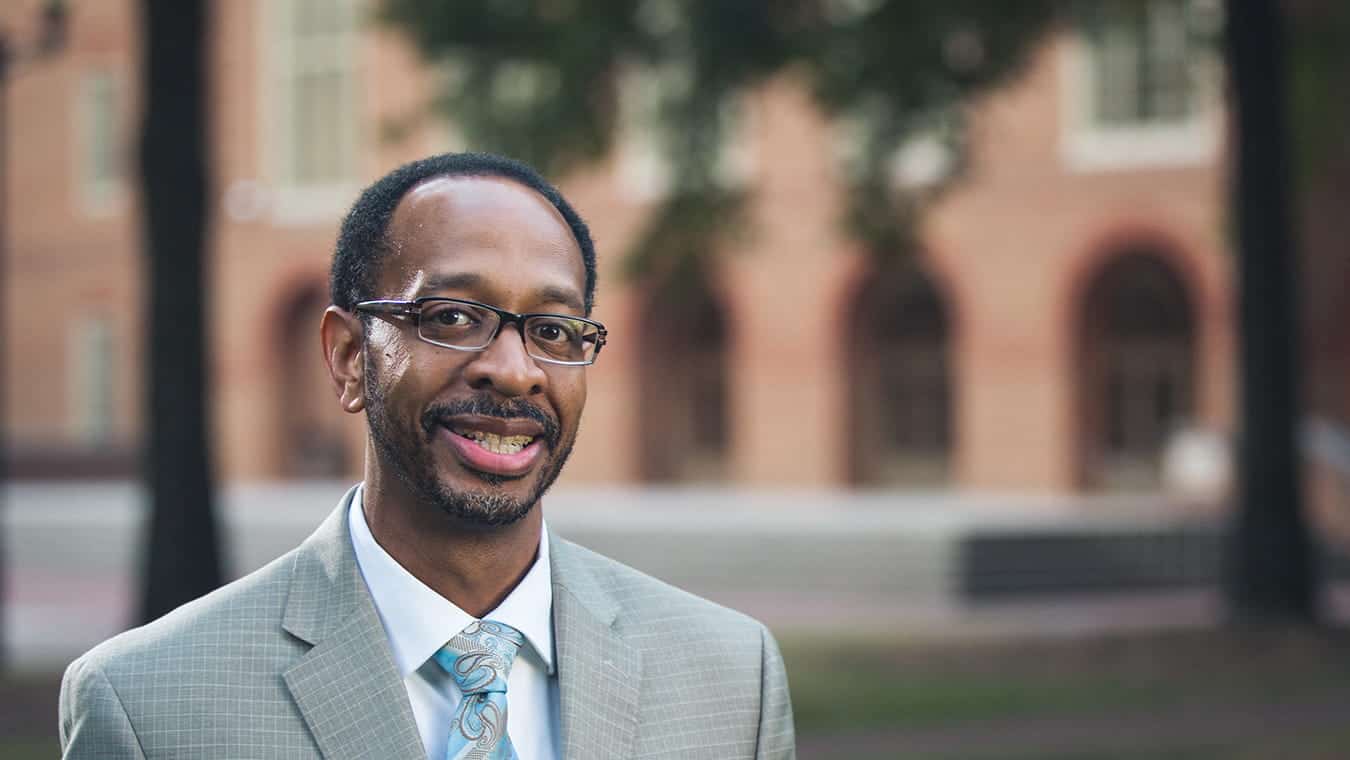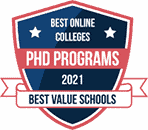
Ph.D. in Education – Educational Psychology
Your Research-Related Path to Purpose
Regent’s Doctor of Philosophy (Ph.D.) in Education – Educational Psychology allows for a broad area of academic inquiry with topics like psychological underpinnings of learning, cognitive strategies for learning in children and adults, creating environments conducive to learning, brain research, teacher education, faculty roles; and professional development in varied settings. You’ll be required to matriculate in additional research courses that will help equip you to use and develop the most appropriate and current theories and research to improve the academic and behavioral success of yourself and others. You’ll also develop habits of mind that will last a lifetime as you pursue rewarding and pivotal roles in differing settings.
INCREASE YOUR EARNING POTENTIAL
Capitalize on a higher salary with your Ph.D. degree.
EXPAND YOUR CAREER PATH
Take your career to the next level with exciting leadership opportunities.
MAKE AN IMPACT
Present ground-breaking research to improve the world of education.
ALIGN YOURSELF WITH EXCELLENCE
Regent has been ranked among the Top National Universities by the U.S. News & World Report (2025). Our programs have also been ranked among the Top 10 Best Online Graduate Education Programs in Virginia for 13 years in a row (2013-2025).
Presented from a Christian worldview, this specialty degree is supported by award-winning faculty in Virginia Beach.
Please complete the Request Information form on this page to learn more about this program.
On completing the Ph.D. in Education – Educational Psychology degree, you can:
- Understand the major theories in developmental psychology using select criteria including a Christian worldview and how that affects learning.
- Provide intellectual leadership in the field of education to prepare you to produce and publish original research.
- Teach at the college level in the areas of research, learning, and behavior management.
Career Opportunities
- University Faculty
- Curriculum Developer
- Educational Assessment Specialist
| EFND 701 | Advanced Human Learning & Motivational Development | 3 | Major theories in developmental psychology using select criteria including a Christian worldview. |
| EFND 724 | Advanced Study of Theories in Learning & Development | 3 | Provides some of the major conjecture and theories used to meet the learning and development needs of adults, and an overview of learning theories, their design and applications for the adult learner in various settings. Investigates topics to include self-directed learning, constructivism, autonomous learning, creative environments conductive to adult learning, designing and implementing training programs and instructional design techniques. |
| EPSY 760 | Collaborative Research | 3 | Guided research collaboration with varying topics of inquiry. |
| EPSY 820 | Advanced Research Review in Educational Psychology | 3 | Analytic review of Educational Psychology research and the processes for conducting research. |
| EPSY 830 | Culture, Communities, & Education | 3 | Highlights a range of complex issues including shifts in cultural practices and implications of these shifts for human or social development in education. |
| EPSY 835 | Psychological Underpinnings of Learning | 3 | Inquiry of psychological, cognitive, conative, and precursors to learning. |
| EPSY 840 | Theories, Issues, & Practice in Educational Psychology | 3 | An inquiry of theories, issues, and practices of educational psychology in objective and purposeful milieu. |
| EPSY 850 | Advanced Study in Educational Psychology | 3 | Advanced survey of the latest topics, lines of research and disciplinary foci currently being addressed in the field of Educational Psychology. Gain in-depth knowledge and understanding of the field and apply this to your personal career interests. |
2024-25 Semester Check-In Deadlines
All students are expected to check-in for the semester two weeks before the session start date. Students should apply, be accepted, enroll in their first courses, and confirm a plan to pay for their courses prior to this date.
| Session | Semester Check-In | Session Start Date |
|---|---|---|
| Session A | Friday, August 9 | Monday, August 19 |
| Session M | Friday, September 6 | Monday, September 16 |
| Session B | Friday, October 11 | Monday, October 21 |
| Session C | Wednesday, January 8 | Monday, January 13 |
| Session T | Friday, January 31 | Monday, February 10 |
| Session D | Friday, March 7 | Monday, March 17 |
| Session E | Friday, May 2 | Monday, May 12 |
| Session F | Friday, June 13 | Monday, June 23 |
Admissions Requirements
Step 1: Apply to Regent University
Submit your application using the Regent University Online Application.
Note: If you are unable to complete our application due to a disability, please contact our Admissions Office at 757.352.4990 or admissions@regent.edu and an admissions representative will provide reasonable accommodations to assist you in completing the application.
Step 2: Submit Your Unofficial Transcripts
Submit your unofficial transcripts to regent.edu/items.
Upon submitting your application, you will receive an email requesting authorization for Regent University to obtain your official transcripts from your U.S. degree-granting institution. International transcripts must be evaluated by a NACES, AACRAO or NAFSA approved agency.
Step 3: Submit Your Government-Issued ID
To ensure academic integrity, Regent University requires a copy of a government-issued ID. Please submit a scanned copy or photograph of it to regent.edu/items.
Please feel free to contact the Office of Admissions at 757.352.4990 or admissions@regent.edu should you have any further questions about the application process.
Note: All items submitted as part of the application process become the property of Regent University and cannot be returned.
Part-Time Students
| Degree | Tuition Cost Per Credit Hour | Average Credit Hours Per Semester | Average Tuition Per Semester |
|---|---|---|---|
| Master of Education (M.Ed.) | $585 | 6 | $3,510 |
| Educational Specialist (Ed.S.) | $820 | 6 | $4,920 |
| Doctor of Education (Ed.D.) | $820 | 3 | $2,460 |
| Doctor of Philosophy (Ph.D.) | $820 | 3 | $2,460 |
Full-Time Students
| Degree | Tuition Cost Per Credit Hour | Average Credit Hours Per Semester | Average Tuition Per Semester |
|---|---|---|---|
| Master of Education (M.Ed.) | $585 | 9 | $5,265 |
| Educational Specialist (Ed.S.) | $820 | 9 | $7,380 |
| Doctor of Education (Ed.D.) | $820 | 6 | $4,920 |
| Doctor of Philosophy (Ph.D.) | $820 | 6 | $4,920 |
Student Fees Per Semester
| University Services Fee (On-Campus Students) | $900 (Fall & Spring) $750 (Summer) |
|---|---|
| University Services Fee (Online Students) | $750 |
PART-TIME STUDENTS
| Degree | Tuition Cost Per Credit Hour | Average Credit Hours Per Semester | Average Tuition Per Semester |
|---|---|---|---|
| Master of Education (M.Ed.) | $565 | 6 | $3,390 |
| Educational Specialist (Ed.S.) | $800 | 6 | $4,800 |
| Doctor of Education (Ed.D.) | $800 | 3 | $2,400 |
| Doctor of Philosophy (Ph.D.) | $800 | 3 | $2,400 |
Full-Time Students
| Degree | Tuition Cost Per Credit Hour | Average Credit Hours Per Semester | Average Tuition Per Semester |
|---|---|---|---|
| Master of Education (M.Ed.) | $565 | 9 | $5,085 |
| Educational Specialist (Ed.S.) | $800 | 9 | $7,200 |
| Doctor of Education (Ed.D.) | $800 | 6 | $4,800 |
| Doctor of Philosophy (Ph.D.) | $800 | 6 | $4,800 |
Student Fees Per Semester
| University Services Fee (On-Campus Students) | $850 (Fall & Spring) $700 (Summer) |
|---|---|
| University Services Fee (Online Students) | $700 |
*Rates are subject to change at any time.
Ph.D. Requirements
A Ph.D. student will (a) complete 21 hours associated with the Ed.D. core curriculum, (b) complete 24-26 hours associated with an Ed.D. concentration, (c) complete an additional 6 hours of research related credit, and (d) complete 16 hours of dissertation research credit—the total program is 67 hours. A candidate for the Ph.D. degree must present an acceptable research-based dissertation. The dissertation demonstrates that the candidate has technical competence in the field and has done research of an independent character. It must add to or modify what was previously known in the candidate’s field of interest or present a significant interpretation of the subject based upon original investigation and research.
Ph.D. students are required to take the following courses:
EDCO 806 Multivariate Statistics (3)
EHEA 805 Advanced Research Design and Analysis (3)
Faculty
Dr. Carr is the concentration chair for Educational Psychology and is committed to your success.
Dr. Paul Carr joined Regent University as an assistant professor of higher education administration in the School of Education in July 2000. He came from The George Washington University where he was director of the Higher Education Administration Master’s and Education Specialist programs. Dr. Carr held several positions with The George Washington University including: director of special projects, director of off-campus technology, and research assistant for Dr. Gary Confessore and Dr. Reynolds Ferrante. Additionally, he taught master’s and doctoral level courses in the Educational Technology Leadership Program, Educational Leadership Program, Human Resource Development Program and Engineering Management Program.
Carr is a member of Sigma Tau Delta and a founding fellow of Beta Phi (GWU Chapter). A native of Norfolk, Virginia, Carr attended Virginia Wesleyan College and earned a B.A. in English with minors in art and religious studies. He then earned an M.A. in Education and Human Development with a concentration in Human Resource Development and a Doctor of Education degree in Higher Education Administration at The George Washington University. His research interests include autonomous learning, human resource development, and organizational leadership.





